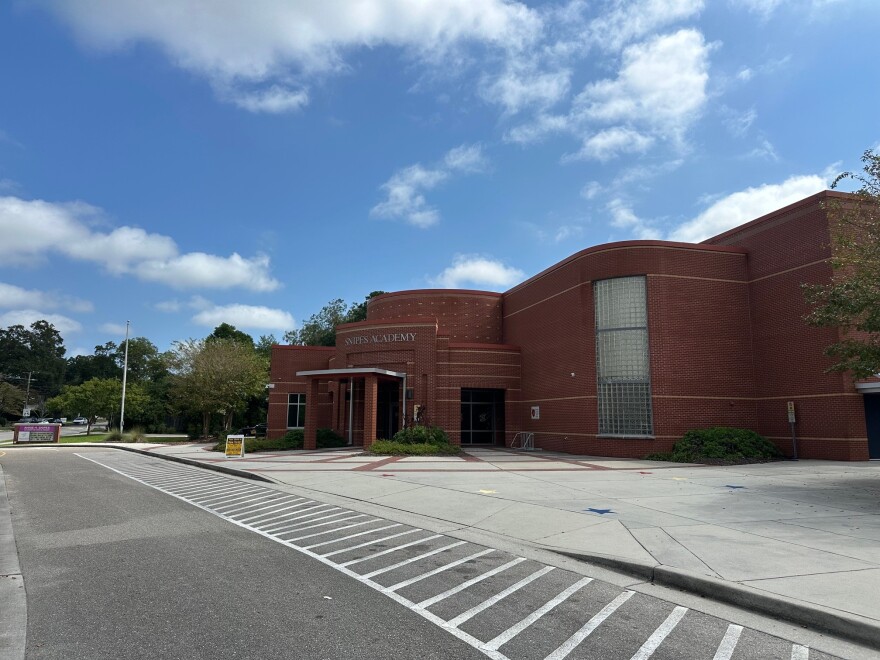Dr. Stephanie Willis is the school’s newest principal. She’s been the assistant principal for the last seven years. She said she wanted to put the school’s grade into context — and point out her students’ resiliency.
“Because our school may have a ‘D’ grade on the outside, that doesn't mean our students aren't deserving. We have some very hard-working students here that deal with trauma that some adults don't even deal with, but they show up every day,” she said.
The North Carolina Department of Public Instruction wants to change how schools are graded. The current system is based on 80% proficiency; the rest (20%) is based on growth, which uses a proprietary algorithm called EVAAS from SAS.
Related: NHCS Turnaround Task Force debates focus on proficiency versus growth metrics
Interim superintendent Dr. Christopher Barnes said that, at the September district task force meeting on low-performing schools, he was proud of Snipes’ improvement but that they needed to continue to support the school so they “don’t cross back.”
Snipes had over 370 students last year, mostly from minority backgrounds. Many receive free or reduced lunch through a federally-funded program made available to families of lower economic status.
Willis said a major component of helping her students succeed is relationship-building with the students and their families.
“The parents need to know that you care about their students. They're sending them somewhere they're going to be safe, cared about, and provided for, so I think those things helped us move the needle in that direction,” she said.

Building a positive culture
Willis’ roots in the school run deep. She attended Snipes from kindergarten until fourth grade, and when she was selected to be its newest principal, her former first-grade teacher congratulated her.
“I was sick as a child, and she would come to my home and provide instruction. Later on, I figured out that was homebound services that teachers did, but it meant a lot for me for my teacher to come to me when I was sick and not able to come to school, and I just want our students to have that same feeling for the teachers here,” she said.
Willis said focusing on positive behavior support has contributed to a better overall school climate — and better academic standing. She said there was more reliance on suspensions when she first arrived, but now students earn points for good behavior – and can exchange them for rewards.
“We have a school store built by one of our partnership churches, and we just have little items in there,” she said.

They also reward classrooms and do whole-school field trips, like taking students to the movies.
Preventing and handling misbehavior
Willis and her staff try to keep students in school for more minor behavioral infractions.
“Because when they're out of school, they're not learning. They're falling further behind than they already are; we don't need that," she said.
She adds that the school has a ‘choices’ room where students go to take a break and has a teacher assistant who helps students in crisis.
This also helps the school’s parents who can’t always take off work to come get students.
They, too, rely on a morning meeting to establish connections with the students. Willis said that’s where they check in with them before they start their academics: "It’s important to center yourself. ‘Where are we today?’”
Willis and her staff also greet children daily at the car and bus line.
“Because we can tell if a student got out of the car this morning and didn't look the same way they looked yesterday," she said, adding that they'll ask a student, ‘Hey, let me give you a hug. What's going on? How can I help you?’"
Willis said in this scenario, they start to deploy personnel like a social worker or counselor to help the student further.

They also have two Community In Schools employees who work with the students.
Another initiative that Willis thinks would further the school’s positive school culture is, starting next year, to bring the ‘Leader in Me’ program to Snipes.
Staffing needs
She also said she hopes to maintain consistency among the staff. Last year, only two teachers were on the transfer list, meaning they wanted to work at another school. This year, they have about six beginning teachers; the rest are beyond the three-year mark.
“So overall, our retention is really good. Teachers love being here. They know the work is hard. They're in it for the kids, so I think having a good culture and just being in it for the kids is the best thing,” she said.
Willis wants to continue building the school’s academic success but says more staff at Snipes would help.
“Our teachers are doing amazing, but our class sizes have increased this school year. You can meet students' needs individually with lower class sizes. [...] Right now, we don't have enough teacher’s assistants (TAs) to cover every classroom, not even in kindergarten and first grade, so yeah, it makes a big difference; eight years ago, when I first came, we had so many personnel, so much support and but we're feeling it this year," she said.
Another example is that the school shares a music teacher – Willis would like to see that as a full-time position. They also used to have a theater position. They share a bilingual parent liaison with Freeman but prefer to have their own, as about 16% of their students are Hispanic. However, she said she’s grateful for a full-time dance teacher and a STEM position.
While Willis said she’s proud of her school and grateful for the support of its families and three community churches, the school doesn’t currently have a parent-teacher association, so she said she’d appreciate volunteers to help the students of Snipes.
“Even if it's reading with a student, going over some math facts, anything that you can do to impact a child's life, our doors are open,” she said.


